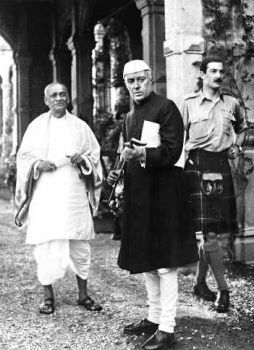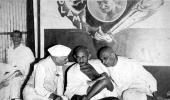 Suddenly the country has been completely taken over by a storm of discussion over the relationship between India’s first home minister Sardar Vallabhbhai Patel and first prime minister Jawaharlal Nehru, largely engineered by some of the major parties in an apparent political move as the crucial general elections draw closer.
Suddenly the country has been completely taken over by a storm of discussion over the relationship between India’s first home minister Sardar Vallabhbhai Patel and first prime minister Jawaharlal Nehru, largely engineered by some of the major parties in an apparent political move as the crucial general elections draw closer.
Bharatiya Janata Party’s prime ministerial candidate Narendra Modi said last week that “every Indian still regrets that Sardar Patel did not became the first prime minister”. The comments that were made in Prime Minister Manmohan Singh’s presence did not go down well with the ruling Congress, which quickly reacted that Modi was “brazenly trying to usurp Patel’s rich legacy for political propaganda”, questioning “whether Modi agreed with Patel’s view on RSS”.
Modi rebutted that “India needed Patel’s secularism, not vote-bank secularism” while addressing the gathering at the stone-laying ceremony of the world’s tallest statue of Sardar Patel in Kevadiya, Gujarat.
On Tuesday, BJP patriarch L K Advani raked up another controversy when he alleged, quoting a book, that Nehru called Sardar Patel a “total communalist” when the latter suggested that army be sent to take over a defiant Hyderabad State after Independence.
There may certainly have been some differences between the two stalwarts; however, it will be nothing short of trivialisation if we blindly adhere to the theory of single dimensional antagonistic relationship that Patel and Nehru shared, as is being proclaimed by some parties.
It is in this context that we reproduce an appreciation article that Sardar Patel wrote on October 14, 1949, a month before Nehru’s 60th birthday for Abhinandan Granth, where he heaped praises on Nehru’s merits and also went on to elaborate the deep ties he shared with him.
Excerpts from the article:
“Jawaharlal and I have been fellow-members of the Congress, soldiers in the struggle for freedom, colleagues in the Congress Working Committee, and other bodies of the Congress, devoted followers of the Great Master who has unhappily left us to battle with grave problems without his guidance, and co-sharers in the great and onerous burden of administration of this vast country. Having known each other in such intimate and varied fields of activity we have naturally grown fond of each other; our mutual affection has increased as years have advanced, and its is difficult for people to imagine how much we miss each other when we are apart and unable to take counsel together in order to resolve our problems and difficulties.
…Gifted with an idealism of high order, a devotee of beauty and art in life, and equipped with an infinite capacity to magnetize and inspire others and a personality which would be remarkable in any gathering of world’s foremost men, Jawaharlal has gone from strength to strength as a political leader.
...It was, therefore, in the fitness of things that in the twilight preceding the dawn of independence he should have been our leading light, and that when India was faced with crises after crises, following the achievement of our freedom, he should have been the upholder of our faith and the leader of our legions. No one knows better than myself how much he has laboured for his country in the last two years of our difficult existence. I’ve seen him age quickly during that period, on account of the worries of the high office that he holds and the tremendous responsibilities that he wields.
…As one older in years, it has been my privilege to tender advice to him on the manifold problems with which we have been faced in both administrative and organizational fields. I have always found him willing to seek and ready to take it. Contrary to the impression created by some interested persons and eagerly accepted in credulous circles, we have worked together as lifelong friends and colleagues, adjusting ourselves each other’s advice as only those who have confidence in each other can.
…It is obviously impossible to do justice to his great and pre-eminent personality in these few condensed words. The versatility of his character and attainment at once defy delineation. His thoughts have sometime a depth which it is not easy to fathom, but underlying them to all is a transparent sincerity and a robustness of youth which endear him to everyone without distinction of caste and creed, race or religion”.
Click HERE to read the full text of Sardar Patel’s appreciation article on Jawaharlal Nehru
Image: A 1947 photograph of Jawaharlal Nehru with Sardar Vallabhbhai Patel
Photograph Courtesy: Wikimedia Commons










